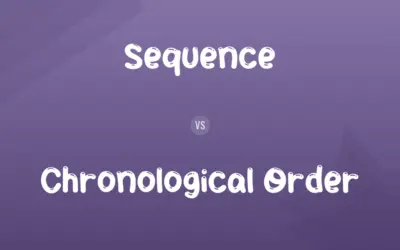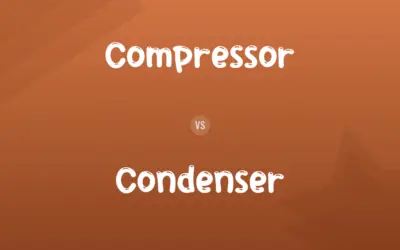Cataplexy vs. Catalepsy: Difference and Comparison
Edited by Muazma Batool — By Muneeza Rehman — Updated on September 22, 2023
Cataplexy involves sudden muscle weakness triggered by emotions, while catalepsy is characterized by muscular rigidity and a lack of response to stimuli.

Difference Between Cataplexy and Catalepsy
Cataplexy and catalepsy are both medical conditions, but they manifest distinctly. Cataplexy is a condition often associated with narcolepsy, characterized by sudden and temporary loss of muscle tone, usually triggered by emotions. Catalepsy, on the other hand, is a symptom seen in various neurological conditions and is characterized by prolonged muscle stiffness and a lack of response to external stimuli, making a person appear as if in a trance.
Muazma Batool
Sep 22, 2023
Cataplexy primarily affects individuals with narcolepsy and impacts their muscle tone, leading to episodes of weakness and loss of voluntary muscle control. Catalepsy is not restricted to a specific condition and can be a feature of several disorders, including Parkinson's disease and certain psychiatric conditions like catatonic schizophrenia. It is marked by an abnormal maintenance of postures and resistance to efforts to be moved.
Muneeza Rehman
Sep 22, 2023
In terms of their presentation, cataplexy causes the affected individual to collapse, although they remain conscious throughout the episode. Catalepsy manifests through rigidity and fixed postures; the person may remain in an awkward position for an extended period without a reaction to the external environment. Both conditions require medical evaluation, but their management and treatment approaches are different due to their distinct pathologies.
Muazma Batool
Sep 22, 2023
In cataplexy, episodes are usually brief, lasting from a few seconds to a couple of minutes, and recovery is typically quick. Catalepsy episodes can vary in duration, and in severe cases, may require medical intervention to relieve the muscular rigidity. Both conditions have significant impacts on the quality of life of affected individuals and necessitate proper medical attention and management.
Leo
Sep 22, 2023
The terms cataplexy and catalepsy may sound similar, but they refer to very different medical phenomena. While the former is associated with a sudden loss of muscle tone, usually in narcoleptics, the latter is linked with prolonged muscle stiffness and can be a symptom of various neurological and psychiatric conditions.
Jonathan
Sep 22, 2023
Cataplexy vs. Catalepsy Comparison Chart
Definition
Sudden and temporary loss of muscle tone
Prolonged muscle stiffness and lack of response to stimuli
Muazma Batool
Sep 22, 2023
Associated With
Typically associated with narcolepsy
Can be seen in various neurological and psychiatric conditions
Muneeza Rehman
Sep 22, 2023
Presentation
Causes collapse due to muscle weakness, individual remains conscious
Manifests through rigidity and fixed postures, person may appear in a trance
Muazma Batool
Sep 22, 2023
Duration
Episodes are usually brief and recovery is quick
Duration can vary, may require medical intervention in severe cases
Elijah
Sep 22, 2023
Impact
Affects quality of life, requires proper management
Impacts quality of life and necessitates medical attention
Muneeza Rehman
Sep 22, 2023
Cataplexy vs. Catalepsy Definitions
◉Cataplexy
Cataplexy is characterized by sudden and temporary loss of muscle tone.
Experiencing cataplexy, he couldn't move but was fully aware of his surroundings.
Muneeza Rehman
Sep 22, 2023
◉Catalepsy
Catalepsy is characterized by muscular rigidity and a fixed posture.
The catalepsy left her in an awkward position, unresponsive to her surroundings.
Elijah
Sep 22, 2023
◉Cataplexy
Cataplexy is typically triggered by strong emotions such as laughter.
A burst of laughter at the joke triggered a cataplexy episode in him.
Nolan
Sep 22, 2023
◉Catalepsy
Individuals with catalepsy may appear as if they are in a trance.
People thought he was meditating, but he was in a state of catalepsy.
Levi
Sep 22, 2023
◉Cataplexy
Individuals with cataplexy remain conscious during episodes.
During his cataplexy episode, he could hear everything around him.
Leo
Sep 22, 2023
◉Catalepsy
During catalepsy, the affected individual does not respond to external stimuli.
Even a loud noise did not disturb her from her catalepsy.
Lucas
Sep 22, 2023
◉Cataplexy
Cataplexy episodes are usually brief, lasting from seconds to a couple of minutes.
After a brief cataplexy episode, he quickly regained control over his muscles.
Muazma Batool
Sep 22, 2023
◉Catalepsy
Catalepsy is a feature of several neurological and psychiatric conditions.
His catalepsy was a symptom of a severe neurological disorder.
Muazma Batool
Sep 22, 2023
◉Cataplexy
Cataplexy is often associated with narcolepsy.
His narcolepsy diagnosis explained the recurrent cataplexy episodes he had been experiencing.
Nolan
Sep 22, 2023
◉Catalepsy
Catalepsy episodes vary in duration and can require medical intervention in severe cases.
The prolonged catalepsy episode necessitated immediate medical attention to relieve his muscular rigidity.
William
Sep 22, 2023
◉Cataplexy
A sudden loss of muscle tone and strength, usually caused by an extreme emotional stimulus.
Muneeza Rehman
May 03, 2023
◉Catalepsy
A condition characterized by lack of response to external stimuli and by muscular rigidity, so that the limbs remain where they are positioned. It occurs in a variety of physical and psychological disorders, such as epilepsy and schizophrenia, and can be induced by hypnosis.
Muneeza Rehman
May 03, 2023
◉Cataplexy
(medicine) An abrupt loss of muscle tone, sometimes associated with narcolepsy.
Muneeza Rehman
May 03, 2023
◉Catalepsy
(pathology) A severe bodily condition, described in psychiatric pathology, marked by sudden rigidity, fixation of posture, and loss of contact with environmental conditions.
Muneeza Rehman
May 03, 2023
◉Cataplexy
A morbid condition caused by an overwhelming shock or extreme fear and marked by rigidity of the muscles.
Muneeza Rehman
May 03, 2023
◉Catalepsy
A sudden suspension of sensation and volition, the body and limbs preserving the position that may be given them, while the action of the heart and lungs continues.
Muneeza Rehman
May 03, 2023
◉Catalepsy
a trancelike state with loss of voluntary motion and failure to react to stimuli
Muneeza Rehman
May 03, 2023
Cataplexy vs. Catalepsy Frequently Asked Questions
Is there a loss of consciousness in catalepsy?
In catalepsy the individual may appear as if in a trance but consciousness is typically retained.
Nolan
Sep 22, 2023
Is consciousness retained during cataplexy episodes?
Yes individuals experiencing cataplexy remain conscious throughout the episode.
Muazma Batool
Sep 22, 2023
What is cataplexy and what causes it?
Cataplexy is a condition characterized by sudden and temporary loss of muscle tone usually caused by strong emotions and is often associated with narcolepsy.
Muazma Batool
Sep 22, 2023
Is cataplexy common in people without narcolepsy?
Cataplexy is predominantly seen in individuals with narcolepsy and is rare in those without it.
William
Sep 22, 2023
How is catalepsy treated and managed?
Catalepsy requires medical evaluation and management which may include addressing underlying conditions and symptom relief.
Muneeza Rehman
Sep 22, 2023
How does catalepsy present and in what conditions is it seen?
Catalepsy is characterized by prolonged muscle stiffness and a fixed posture and is a feature of various neurological and psychiatric conditions like Parkinson's disease and catatonic schizophrenia.
Muneeza Rehman
Sep 22, 2023
How long do cataplexy episodes last?
Cataplexy episodes are usually brief lasting from a few seconds to a couple of minutes with quick recovery.
Jonathan
Sep 22, 2023
Is treatment available for cataplexy?
Yes treatment options are available for cataplexy including medications and lifestyle modifications to manage symptoms.
Jonathan
Sep 22, 2023
How does catalepsy impact daily life?
Catalepsy can significantly impact the quality of life of affected individuals due to muscle rigidity and fixed postures and requires proper medical attention and management.
Kaitlyn
Sep 22, 2023
Can catalepsy occur without an underlying medical condition?
Catalepsy is typically a symptom of an underlying medical condition and is not usually seen in the absence of such conditions.
Henry
Sep 22, 2023
Content Creators
Written by
Muneeza RehmanAt Comparisons.wiki, Muneeza skillfully navigates the vast sea of information, ensuring clarity and accuracy as the lead content editor. With a keen eye for detail, she curates every comparison to enlighten and engage readers.
Edited by
Muazma BatoolAs a content editor, Muazma Batool is not just a grammar guru but a creative mastermind who breathes life into every word. With an eagle eye for detail and a passion for storytelling, she transforms bland text into engaging content that captivates audiences and drives results.

































